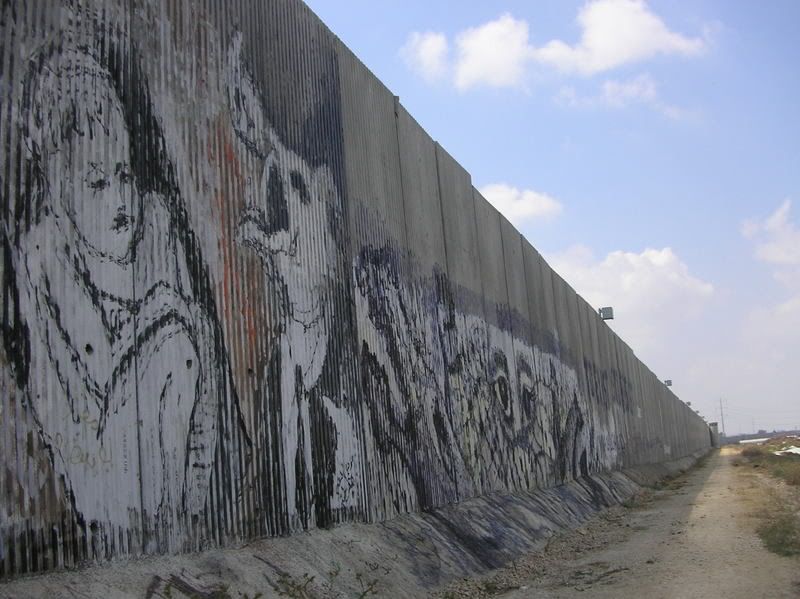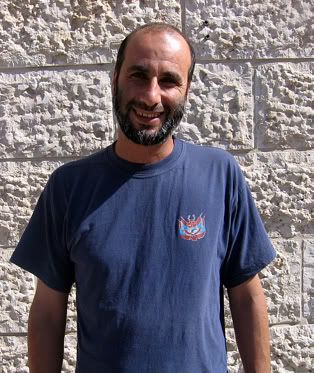
More Orwellian subterfuge from Israel.
Israel is no more interested in making peace today than it was at Camp David in 2000. Not at least until it has confiscated considerably more Palestinian land, demolished more and more Palestinian villages, and ethnically cleansed more and more Palestinian families, which is just to say, not for many, many years. Forget the Hamas threat. Forget the so-called Abbas government. There is no such thing. Israel’s military governs the West Bank through Tel Aviv.
This development tells you what Israel is all about:
ISRAEL-OPT: Some 600 villagers face prospect of new displacement
AL-WALAJE (WEST BANK), 28 June 2007 (IRIN) – Nearly all the Palestinian residents of al-Walaje village were displaced by the 1948 Israeli-Arab war or are descendants of those displaced, and many now again face the prospect of forced displacement, this time to make room for a possible new Israeli settlement and the construction of the Israeli West Bank separation barrier.
About 600 people, all refugees registered with UNRWA, the UN agency for Palestinian refugees, live in the Ein Jwesia section of al-Walaje. Now, many of these Palestinians are concerned that they will lose their homes and land.
“I have two demolition orders against my home,” said Amin al-Atrash, from Ein Jwesia (above).
“About 30 houses have already been destroyed in the village over the years,” he added.
As the residents are registered refugees, their case has been closely followed by UN agencies, although there is concern among aid workers that the efforts are “too little, too late”.
Israel’s view
Shlomo Dror, from the Israeli minister of defence, said the houses are being demolished as they are illegal. “It’s the law,” he said.
He was certain though that the villagers would be able to continue accessing their land.
“They’ll get permits,” he said. “We always set up options for people who are disconnected from their land.”
The villagers, however, say they would rather be able to access their land without bureaucratic complications, and uncertainties about how the system will work in the future.
Grave concern
“The situation of those living in Al-Walaje is of grave concern,” said one UNRWA official who closely follows the village’s case.
“These are 1948 refugees [those who left when the state of Israel was created]. They stand to lose everything all over again and to go through the trauma of yet another displacement if their homes are demolished,” she [the official] added.
The 1948 war divided the village in two, with half – the residential part, known now as “old Walaje” – falling under Israeli control.
Some 600 residents fled the area, while about 1,000 people restarted their lives on their agricultural land nearby, which was then under Jordanian auspices.
“Everyone promised us we would be able to return to our village,” said al-Atrash. “But we were never allowed to.”
In 1967 Israel annexed half of the remaining parts of Walaje along with East Jerusalem, which it considers to be an inseparable part of the Jewish state.
Since the people of Walaje hold West Bank ID cards, they are not allowed into Jerusalem without Israeli-issued permits. However, as significant parts of Walaje are inside municipal Jerusalem, the villagers face an absurd situation.
“People have been arrested for being inside Jerusalem without the right permits, even when they were in their own homes,” explained al-Atrash.
Demolitions began in 1985
Problems began for the residents in 1985, when Israeli authorities began to demolish homes. The problems further escalated in 2004, when plans to build a new Jewish settlement, as well as the barrier, on the parts of Walaje annexed into Jerusalem were announced.
“Most of the agricultural land will be behind the wall and disconnected from the village,” said Shawki Issa, a lawyer who helped fight land confiscation orders.
“This village has no future like this, surrounded by settlements and walls,” he said.
The new settlement, Givat Yael, is planned to surround the village on three sides, while another settlement, already built, blocks it on the fourth side.
“What this [new] settlement will do to their lives, it will choke them completely, ruin the peaceful existence of this village,” said Meir Margolit, who was a member of the Jerusalem City Council, and now works with the residents on their housing rights.
Al-Atrash says that already many young people are leaving the village because there simply are no places for them to live as open land for building is now very limited.
This report is from the UN Office for the Coordination of Humanitarian Affairs (reprinted by permission).


Received this morning from Jews sans frontieres:
You Can’t Trust Israel
So there! I was just going to blog an old article about Tommy Lapid and then I thought I’d better google “Israel” first just in case there’s a hot news item I’d be missing. I got this little nugget from Ynet, Yediot Aharanot on line. It’s headed Israel’s hollow declarations and it gives a blow by blow account of how Israel is making the prospect of a Palestinian state impossible. It also goes into the absurd spin placed on every zionist statement:
Olmert’s problem, and in fact the problem faced by all of us, is that in reality one cannot fool all the people all the time. Certainly not the Palestinians, who continue to see on a daily basis how more land is being taken away and paved under the wheels of the settlement and annexation machine, which does not rest even for a day.
At one location land is being seized for building the fence, with “only” 80 percent of it being built east of the Green Line, that is, in West Bank territory. Elsewhere land is being seized in favor of expanding one or another “consensus settlement.”
Simultaneously, at the heart of the West Bank, settlers who are fans of organic agriculture, plant vineyards on land that up until recently was worked by Palestinian farmers, while yet another bypass road is being paved on land confiscated with the High Court’s approval for “public benefit.”
After all, in the West Bank everything is always done for public benefit – the Israeli public that is (which accounts for only 10 percent of the West Bank’s population).
In order to calibrate the national expectation gauge of the Sharm el-Sheik summit and the festive declarations that followed it, it would be worthwhile for us Israelis to one day clarify to ourselves, among the other terms we use routinely in order to describe our realities, the term “consensus.”
The Even-Shoshan dictionary defines the term as follows: “general agreement,” “unanimity,” or “homogenous position.” Where then does consensus have to prevail when it comes to the issue of settlements? Are we talking about a consensus between the Labor and Kadima parties? Or perhaps a consensus between the settler Right and all those who have yet to pledge their allegiance to the notion of the Greater Land of Israel?
Olmert’s problem is that he can’t fool the Palestinians? But he’s not even trying to fool the Palestinians. He’s got the Quartet on his side.
and this is news? Why should they even attempt peace when they have 90% of Christians believing that they are God’s “chosen” people. I mean, talk about your racism…these people glorify a man who killed 5,000 uncircumcised men with the jaw-bone of an ass. I don’t think that there will ever be a solution – and talking about it only makes me angry….
No it is not news for those who seek the truth. Americans are oblivious to the reality. Just kicking a dead horse, perhaps in the wrong place.
Booman is only a tiny corner of the world and not many are lending an ear to what is said here. Daily Kos is a better place to increase the volume.